13 Oct2020
By Mary Murray
This article originally appeared in University Business and is reprinted with permission.

Photo by Nikolas Noonan on Unsplash
At the onset of the 2020-21 academic year, the educational system is in a coronavirus maze, wherein the turns are constantly changing, and the end seems out of sight. While state education departments, school districts and educator preparation programs (EPPs) are prepared—whether in class, online, or a hybrid of both—the pandemic reminds us how unpredictable the road ahead may be. Recently, some schools in the United States that reopened for in-class instruction have reversed their plans due to COVID-19 outbreaks.
13 Oct2020
By Nadine Gilbert
This article, part one of a three-part series, originally appeared on the Education First Blog and is reprinted with permission.
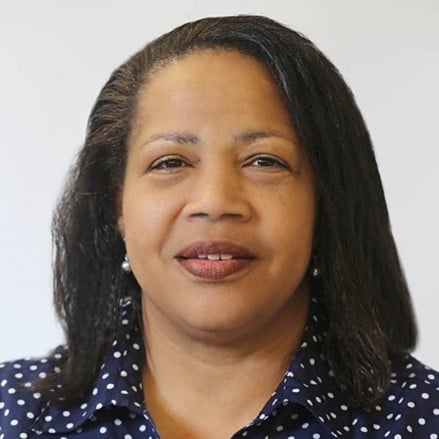 Back in 2015, a group of department chairs, administrative leadership, program directors and faculty at Jackson State University formed a task force to write a plan for transforming our teacher preparation program. In that plan, we identified areas of strength and areas we needed to improve. We wanted to build on the deep experience and wisdom of faculty, while taking a fresh look at how we could more strongly ground the experience of our teacher candidates in current K12 practices. At around that same time, we were fortunate to find incredible support by joining the US PREP coalition. With JSU leaders and faculty leading the way, the US PREP peer network and coaches acted as critical friends to strengthen and accelerate our work. We have achieved so much together.
Back in 2015, a group of department chairs, administrative leadership, program directors and faculty at Jackson State University formed a task force to write a plan for transforming our teacher preparation program. In that plan, we identified areas of strength and areas we needed to improve. We wanted to build on the deep experience and wisdom of faculty, while taking a fresh look at how we could more strongly ground the experience of our teacher candidates in current K12 practices. At around that same time, we were fortunate to find incredible support by joining the US PREP coalition. With JSU leaders and faculty leading the way, the US PREP peer network and coaches acted as critical friends to strengthen and accelerate our work. We have achieved so much together.
13 Oct2020
By John Blackwell
This article is a personal reflection of the 2020 Washington Week State Leaders Institute by attendee John Blackwell.
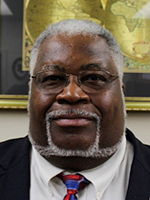 As academics who value valid evidence and scientifically proven knowledge, we know that, concerning human beings, there is only one race—the human race. We have lived our entire lives knowing that race is one of the most divisive topics you could ever introduce in any conversation or classroom. Robin DiAngelo, in her book, ‘White Fragility’: Why It’s So Hard for White People to Talk about Racism, explains so clearly the idea of race was created, “as an evolving social idea that was created to legitimize racial inequality and protect white advantage.” Despite this knowledge, the term racism has been weaponized to condemn anyone who uses it. When having discussion about racism, it is difficult for one to see beyond their emotion to get to the actual facts.
As academics who value valid evidence and scientifically proven knowledge, we know that, concerning human beings, there is only one race—the human race. We have lived our entire lives knowing that race is one of the most divisive topics you could ever introduce in any conversation or classroom. Robin DiAngelo, in her book, ‘White Fragility’: Why It’s So Hard for White People to Talk about Racism, explains so clearly the idea of race was created, “as an evolving social idea that was created to legitimize racial inequality and protect white advantage.” Despite this knowledge, the term racism has been weaponized to condemn anyone who uses it. When having discussion about racism, it is difficult for one to see beyond their emotion to get to the actual facts.
08 Oct2020
By Rebecca Koenig
The following is a quote from AACTE President and CEO Lynn M. Gangone from the article, which originally appeared in EdSurge and is reprinted with permission:

“With a 120-hour curriculum, it’s hard to find space to add more,” Gangone says. “There’s the basic ed-prep work, and then you’ve got all the other things that end up being initially seen as ancillary but aren’t—like social and emotional learning.”
On an ordinary June morning, kids descend on the campus of Auburn University to try science experiments at the college of education’s annual STEM camp. It’s an opportunity for the future teachers who are enrolled at the college to apply what they learn in class in a practical setting, testing out lesson plans with real elementary students.
This year, camp is canceled due to COVID-19. But education students still need to work on lesson plans, and kids still need summer activities. So the college is asking its future teachers to make online activity guides and videos for Home Works, a new distance learning program designed to help kids connect the curricula they usually learn in person at school or camp with what’s going on in their real lives—which right now mostly means being stuck at home.
“I want to make sure my undergrads are thinking about their impact outside of a formal classroom,” says Martina P. McGhee, assistant clinical professor of elementary education at Auburn University.
08 Oct2020
By Tariq Akmal
This article is a personal reflection of the 2020 Washington Week State Leaders Institute by attendee Tariq Akmal.
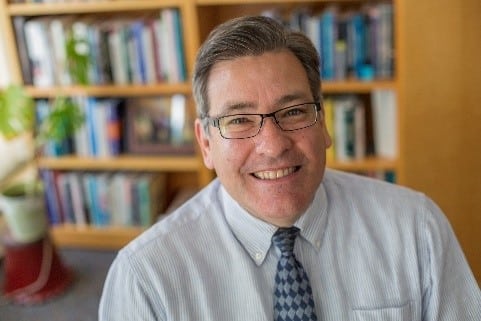 I was fortunate to attend the State Leaders Institute breakout session on State Government Advocacy with Three State Chapters. Attendees heard from Christine Carrino Gorowara of Delaware, Scott Hewitt of Florida, and Vanessa Anton and Robin Fuxa of Oklahoma. This session was a sharing of the different types of advocacy activities that were occurring in three states. The variation in state size/population was very evident in the scale of activities of each chapter. What did they hold in common? They are all active in advocacy work and are experiencing a teacher shortage in their states. Each panelist shared particular aspects of their association’s work with their state department of education, legislators, and other stakeholders within their states.
I was fortunate to attend the State Leaders Institute breakout session on State Government Advocacy with Three State Chapters. Attendees heard from Christine Carrino Gorowara of Delaware, Scott Hewitt of Florida, and Vanessa Anton and Robin Fuxa of Oklahoma. This session was a sharing of the different types of advocacy activities that were occurring in three states. The variation in state size/population was very evident in the scale of activities of each chapter. What did they hold in common? They are all active in advocacy work and are experiencing a teacher shortage in their states. Each panelist shared particular aspects of their association’s work with their state department of education, legislators, and other stakeholders within their states.
The Delaware Association of Colleges for Teacher Education (DACTE) had “flipped the script” on the traditional Day On the Hill approach and now brought specific Delaware legislators to their association for conversations regarding how DACTE could be a resource to legislators on educational issues and to build relationships so that DACTE would be invited to legislative initiatives on education. They invited members of the House and Senate Education Committee, in particular, which seems to be a highly effective strategy! Carrino Gorowara noted how they became collaborators in developing legislation that would be a help to Delaware teacher candidates in simplifying the background check process.
07 Oct2020
By Jacqueline E. King, Ph.D.
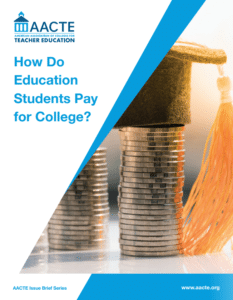 There is a growing body of research suggesting that concerns about compensation generally—and about being able to repay student loans in particular—are dissuading college students from choosing teaching as a career. These financial concerns have only been exacerbated by COVID-19 and its attendant financial crisis.
There is a growing body of research suggesting that concerns about compensation generally—and about being able to repay student loans in particular—are dissuading college students from choosing teaching as a career. These financial concerns have only been exacerbated by COVID-19 and its attendant financial crisis.
To help members better understand the financial pressures impacting education students, AACTE has released the new How Do Education Students Pay for College? issue brief that takes a detailed look at how students pursuing a bachelor’s degree in education pay for college, including the costs they face and the financial sources they tap to meet those expenses.
On Wednesday, October 21 from 3:00 – 4:00 p.m. ET, AACTE will host a webinar on this important topic. As the issue brief’s author, I will review the research findings, and I’ll be joined by AACTE consultant Jane West for a discussion of the implications of these findings for campus practice and federal policy. West will also share AACTE’s priorities for strengthening aid to future educators in federal appropriations bills as well as the reauthorization of the Higher Education Act.
The one-hour session will feature time for questions and discussion.
Register now.
07 Oct2020
By Jerrica Thurman
AACTE’s virtual
2020 Leadership Academy Series will be held in three sessions on October 14, October 27, and November 10. Themed “Leading During Difficult Times,” the sessions will feature best practices on diversity, equity, and inclusion in education; effective decision-making during crisis; and re-imagining field experiences and partnerships.
Here’s what attendees are looking forward to learning most during this year’s virtual Leadership Academy Series:

“I am most looking forward to learning from others innovative ideas and perspectives about educator preparation during these difficult times. I believe this experience has pushed everyone to think differently about educator preparation, and we are learning and figuring out new, productive strategies that have the potential to permanently change how we prepare future educators. – Jan Burcham, Columbus State University

“I’m interested in learning about how best to continue forward movement and growth while also taking into consideration the heaviness that many are feeling from all the uncertainties and fears associated with the pandemic. – Leah Nellis, Indiana University Kokomo

“I am excited to deepen my connection to AACTE through this series of workshops. The disparity in educational access has grown exponentially and conscientious leaders need to collaborate across institutions to develop creative and effective solutions that give our teacher candidates the tools they need to support all students equitably. I am confident this workshop will be an inspiration! – Amber L. Bechard, Ed.D., University of La Verne
The Academy Series has sold out! Stay tuned for information on how you can access the presentations. Visit
www.aacte.org for event details. Follow us on
Twitter and
Facebook, and join the conversation using #AACTELA20.
07 Oct2020
By Weade James
AACTE recently published an article in the Success in High Need Schools Journal to amplify promising practices for recruiting and retaining teacher candidates. In this article, titled “The Use of Networked Improvement Communities in Educator Preparation Programs to Improve Teacher Shortage and Diversity”, Jacqueline Rodriguez , AACTE vice president, research, policy, & advocacy, and I highlight the contributing factors to the teacher shortage and diversity crises in our nation.
These factors include but are not limited to the declining enrollment and degrees awarded in education, financial barriers to pursuing a teaching credential, and the lack of culturally-relevant strategies to attract and retain diverse candidates. Research show that these factors are more prevalent for minorities, thus contributing to the dismal representation of minority teachers in the profession compared to their White counterparts (80%).
07 Oct2020
By Elizabeth Stringer Keefe, Rebekah Louis, Lisa D’Souza, Patricia Mason and Adam Steiner
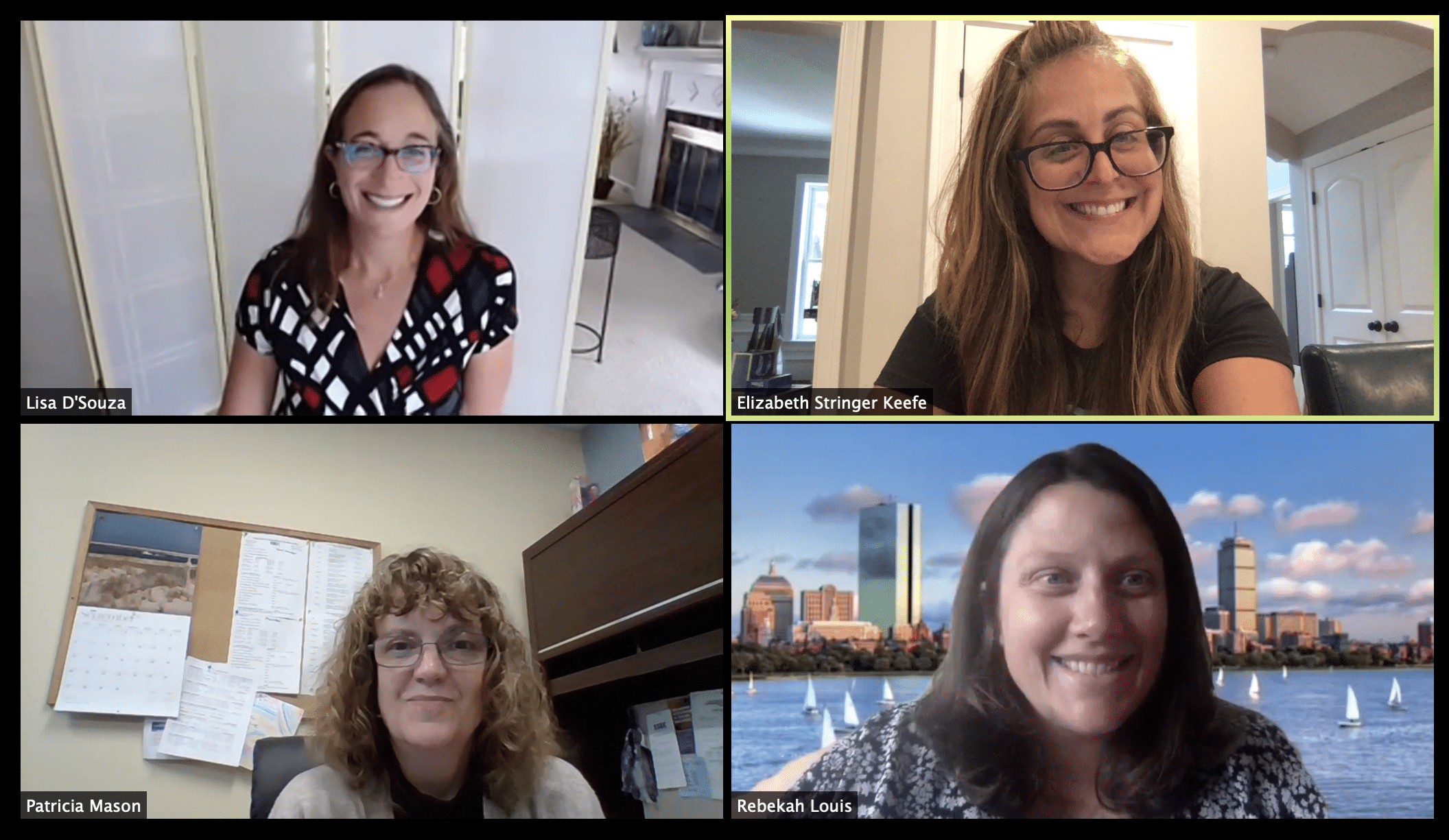
The text of this article is adapted from Project SOLVE’s free resource, Strategies for Virtual Education: Resources for Educators and Teacher Educators.
Project SOLVE (Strategies and Opportunities for Leading Virtual Learning) is a small inquiry research group comprised of Massachusetts-based teacher educators and PK-22 practitioners who came together in response to widespread school closures, the result of the coronavirus pandemic of 2020 that forced PK-22 teacher and teacher educators’ sudden use of technology into educational and instructional planning and decisions. The group was formed in response to widespread inequity, an urgent need for increased training for teachers, uneven resources, and lack of practical solutions to help us move forward as a field. Members brought varied expertise to the table: PK-22 experience and teacher preparation, as well as a combination of technology, general and special education expertise, and work in equity and social justice education. Harnessing the group’s collective experience, expertise, and resources helped to chart a path forward instead of waiting for direction, a pattern of treading water that we all found ourselves in and frustrated by.
07 Oct2020
By Karen Hammerness, Julie Contino and Maritza McDonald
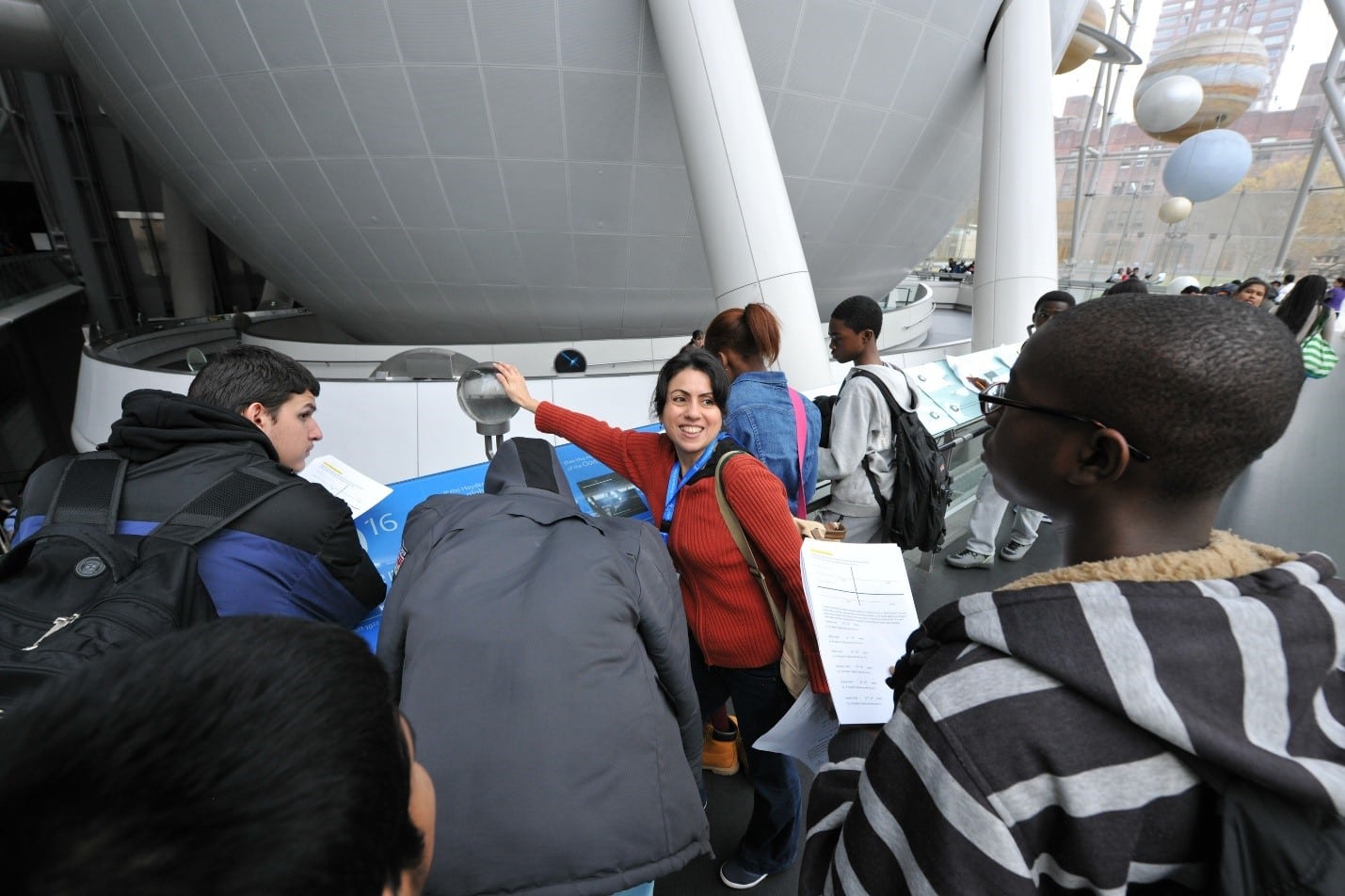
Photo Credit: Denis Finnin, AMNH
This article is part of a series on clinically rich teacher preparation in New York State, coordinated by Prepared To Teach at Bank Street College. The text is adapted from their latest report, Making Teacher Preparation Policy Work: Lessons From and For New York, and shared by the featured institution.
The American Museum of Natural History (AMNH) may be most well-known for its long history of scientific research, and for its expansive galleries featuring casts of dinosaurs, or dioramas from around the world, and the 94-foot long Blue Whale suspended in the Hall of Ocean Life. However, for just as long as the museum has been engaged in educating the public about scientific phenomena through visits, the museum has been supporting teachers and teaching. Since just after the museum opened in 1880, the museum offered lecture courses for teachers, broadening offerings by the 1920s. In the late 1930s, the museum offered a preparation program for teachers interested in using out-of-school learning experiences in their classrooms. Today, the museum offers a wide range of professional development opportunities for teachers in science, as well as works in partnership with cultural institutions around the city to support science teacher development.
05 Oct2020
By Mary Murray
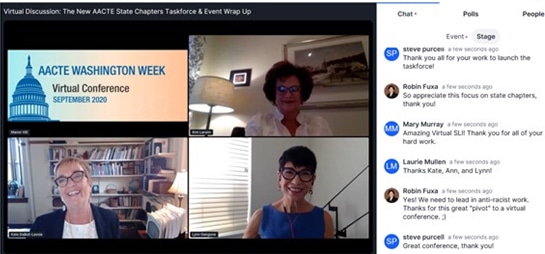
Last month, during the AACTE State Leadership Institute (SLI), I attended the session on the newly formed State Chapter Taskforce, which was moderated by AACTE President and CEO Lynn Gangone, AACTE president and CEO; Ann Larson, chair, AACTE Board of Directors; and Kate LaBoll-Lavoie, chair, Advisory Council of State Representatives (ACSR) and AACTE Board member. State Chapters, a network of AACTE member institutions that are organized collectively to advocate for and to address educator preparation issues in their state, helps provide direction to AACTE. This very important taskforce was formed to:
- Review the existing policy on the relationship between AACTE and the state chapters, the practices and experience of peer associations, and advice of legal counsel
- Consider the desired relationship between AACTE and state chapters. How do AACTE and the state chapters want to see the relationship evolve?
- Recommend revisions to state chapter policy to the AACTE Board of Directors
- Provide recommendations to the Board and National Office staff on how AACTE could best collaborate with the chapters, particularly with regard to state policy advocacy
05 Oct2020
By Claudine Keenan
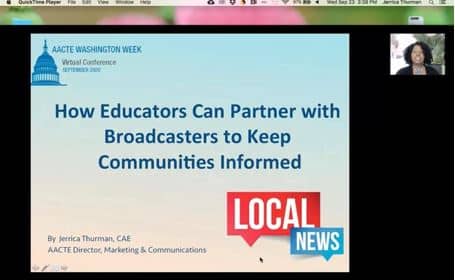
At the 2020 State Leaders Institute, AACTE’s director of marketing and communications, Jerrica Thurman, shared some excellent “how-to,” exemplars, and resources that helped attendees understand How Educators Can Partner with Broadcasters to Keep Communities Informed. From the very basic level of helping us understand how each type of media outlet is organized and what drives each of their interests in news we might have to share, all the way to the very specific steps educators can take to sharpen our skills as subject matter experts, Thurman offered a session that all attendees valued.
The basics began with an eye-opening update about where most Americans get their news, revealing that local television, radio, and daily newspapers are still in the lead. In fact, Americans increased their average of watching local news from 4 hours to 5 hours per week over the last 15 years (RTDNA/Hofstra Surveys). Over the last 10 years, Pew Research surveys have also shown that the percentage of Americans who listen to radio (terrestrial or streaming) has increased from 25% to more than 50% over the last 10 years. Thurman laid this as the groundwork for educators to see that our potential audiences are seeking out more information sources during the same time period.
05 Oct2020
By Jane E. West
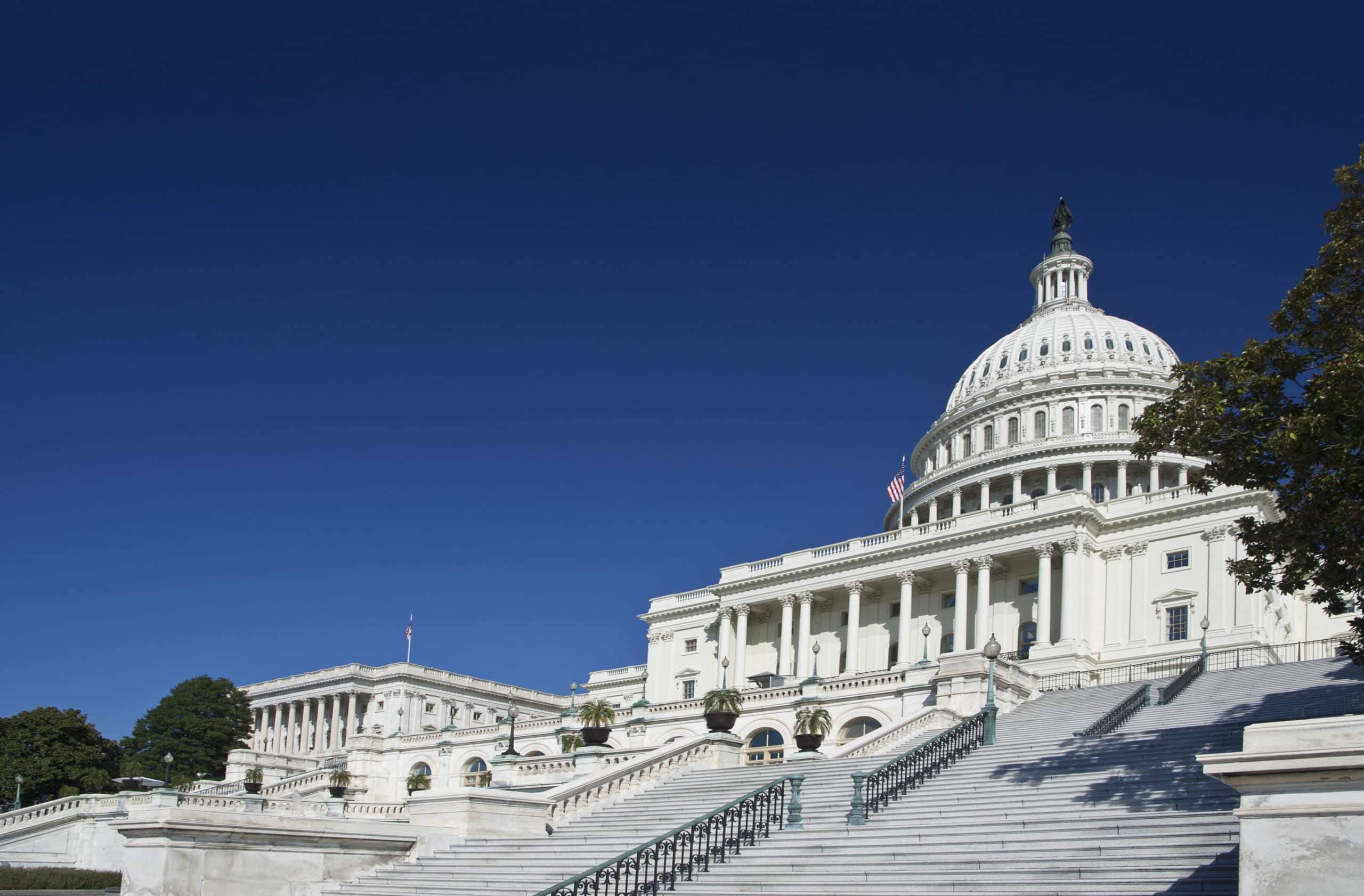 This blog post is written by AACTE consultant Jane West and is intended to provide updated information. The views expressed in this post do not necessarily reflect the views of AACTE.
This blog post is written by AACTE consultant Jane West and is intended to provide updated information. The views expressed in this post do not necessarily reflect the views of AACTE.
The Senate Passes Funding Bill to Avoid Government Shutdown/ COVID Funding Bill Remains Stalled
The federal fiscal year ended on Wednesday, September 30 at midnight. That day, the Senate passed a bill (with a 84-10 bipartisan vote) to keep the government funded at last year’s level temporarily—a stopgap measure called a Continuing Resolution. The House passed the same bill last week with a bipartisan vote. The President signed the bill a few hours after the deadline—early Thursday morning—so that functioning and funding of the federal government continues uninterrupted. The bill expires December 11, after the election, leaving a lame duck session of Congress to deal with it.
In the House, Speaker Pelosi (D-CA) was absorbed in trying to come up with a last-minute deal with the White House to secure a long-awaited next COVID relief package. She met repeatedly with Treasury Secretary Steve Mnuchin, who appears to be the White House’s lead on this, but did not achieve a final deal. So, she turned to her Democratic colleagues in the House and passed a trimmed-down version of the HEROES Act—their COVID relief bill that passed several months ago, but made no headway in the Senate.
05 Oct2020
By Weade James
AACTE continues to expand the Holmes Program to provide relevant mentorship, support, and professional development to graduate students of color pursuing a degree in education. Holmes scholars represent the next generation of diverse faculty and leaders who will advance the field and address the equity and opportunity gaps in our nation’s educational system. We are thrilled to welcome five new scholars from Texas Christian University (TCU) and Austin Peay State University: Leslie Ekpe, Cara Jones, DeAndrew Rainey, Ebony Love, and Ariela Martinez.
05 Oct2020
By Jerrica Thurman
AACTE officially announced today that its 2021 Annual Meeting will be offered virtually. Themed “Resisting Hate, Restoring Hope: Engaging in Courageous Action,” the conference will now be held
February 24-26, 2021.
Educators have the opportunity to take action against inequities during these challenging times. By participating in the AACTE 2021 Annual Meeting, you can join a united effort to disrupt inequities while educating for inclusion and change. AACTE offers keynotes featuring dynamic speakers, deeper dives into complex education issues, and learning labs for equipping attendees with practical skills for advancing programs and institutions.
This year’s conference is organized into four strands:



 Back in 2015, a group of department chairs, administrative leadership, program directors and faculty at Jackson State University formed a task force to write a plan for transforming our teacher preparation program. In that plan, we identified areas of strength and areas we needed to improve. We wanted to build on the deep experience and wisdom of faculty, while taking a fresh look at how we could more strongly ground the experience of our teacher candidates in current K12 practices. At around that same time, we were fortunate to find incredible support by joining the
Back in 2015, a group of department chairs, administrative leadership, program directors and faculty at Jackson State University formed a task force to write a plan for transforming our teacher preparation program. In that plan, we identified areas of strength and areas we needed to improve. We wanted to build on the deep experience and wisdom of faculty, while taking a fresh look at how we could more strongly ground the experience of our teacher candidates in current K12 practices. At around that same time, we were fortunate to find incredible support by joining the  As academics who value valid evidence and scientifically proven knowledge, we know that, concerning human beings, there is only one race—the human race. We have lived our entire lives knowing that race is one of the most divisive topics you could ever introduce in any conversation or classroom. Robin DiAngelo, in her book, ‘White Fragility’: Why It’s So Hard for White People to Talk about Racism, explains so clearly the idea of race was created, “as an evolving social idea that was created to legitimize racial inequality and protect white advantage.” Despite this knowledge, the term racism has been weaponized to condemn anyone who uses it. When having discussion about racism, it is difficult for one to see beyond their emotion to get to the actual facts.
As academics who value valid evidence and scientifically proven knowledge, we know that, concerning human beings, there is only one race—the human race. We have lived our entire lives knowing that race is one of the most divisive topics you could ever introduce in any conversation or classroom. Robin DiAngelo, in her book, ‘White Fragility’: Why It’s So Hard for White People to Talk about Racism, explains so clearly the idea of race was created, “as an evolving social idea that was created to legitimize racial inequality and protect white advantage.” Despite this knowledge, the term racism has been weaponized to condemn anyone who uses it. When having discussion about racism, it is difficult for one to see beyond their emotion to get to the actual facts.
 I was fortunate to attend the State Leaders Institute breakout session on State Government Advocacy with Three State Chapters. Attendees heard from Christine Carrino Gorowara of Delaware, Scott Hewitt of Florida, and Vanessa Anton and Robin Fuxa of Oklahoma. This session was a sharing of the different types of advocacy activities that were occurring in three states. The variation in state size/population was very evident in the scale of activities of each chapter. What did they hold in common? They are all active in advocacy work and are experiencing a teacher shortage in their states. Each panelist shared particular aspects of their association’s work with their state department of education, legislators, and other stakeholders within their states.
I was fortunate to attend the State Leaders Institute breakout session on State Government Advocacy with Three State Chapters. Attendees heard from Christine Carrino Gorowara of Delaware, Scott Hewitt of Florida, and Vanessa Anton and Robin Fuxa of Oklahoma. This session was a sharing of the different types of advocacy activities that were occurring in three states. The variation in state size/population was very evident in the scale of activities of each chapter. What did they hold in common? They are all active in advocacy work and are experiencing a teacher shortage in their states. Each panelist shared particular aspects of their association’s work with their state department of education, legislators, and other stakeholders within their states.  There is a growing body of research suggesting that concerns about compensation generally—and about being able to repay student loans in particular—are dissuading college students from choosing teaching as a career. These financial concerns have only been exacerbated by COVID-19 and its attendant financial crisis.
There is a growing body of research suggesting that concerns about compensation generally—and about being able to repay student loans in particular—are dissuading college students from choosing teaching as a career. These financial concerns have only been exacerbated by COVID-19 and its attendant financial crisis.
 “I am most looking forward to learning from others innovative ideas and perspectives about educator preparation during these difficult times. I believe this experience has pushed everyone to think differently about educator preparation, and we are learning and figuring out new, productive strategies that have the potential to permanently change how we prepare future educators. – Jan Burcham, Columbus State University
“I am most looking forward to learning from others innovative ideas and perspectives about educator preparation during these difficult times. I believe this experience has pushed everyone to think differently about educator preparation, and we are learning and figuring out new, productive strategies that have the potential to permanently change how we prepare future educators. – Jan Burcham, Columbus State University  “I’m interested in learning about how best to continue forward movement and growth while also taking into consideration the heaviness that many are feeling from all the uncertainties and fears associated with the pandemic. – Leah Nellis, Indiana University Kokomo
“I’m interested in learning about how best to continue forward movement and growth while also taking into consideration the heaviness that many are feeling from all the uncertainties and fears associated with the pandemic. – Leah Nellis, Indiana University Kokomo  “I am excited to deepen my connection to AACTE through this series of workshops. The disparity in educational access has grown exponentially and conscientious leaders need to collaborate across institutions to develop creative and effective solutions that give our teacher candidates the tools they need to support all students equitably. I am confident this workshop will be an inspiration! – Amber L. Bechard, Ed.D., University of La Verne
“I am excited to deepen my connection to AACTE through this series of workshops. The disparity in educational access has grown exponentially and conscientious leaders need to collaborate across institutions to develop creative and effective solutions that give our teacher candidates the tools they need to support all students equitably. I am confident this workshop will be an inspiration! – Amber L. Bechard, Ed.D., University of La Verne 



 This blog post is written by AACTE consultant Jane West and is intended to provide updated information. The views expressed in this post do not necessarily reflect the views of AACTE.
This blog post is written by AACTE consultant Jane West and is intended to provide updated information. The views expressed in this post do not necessarily reflect the views of AACTE.